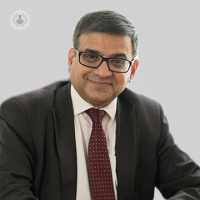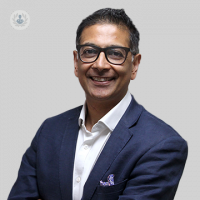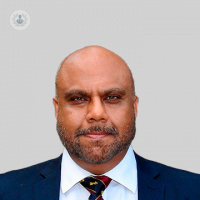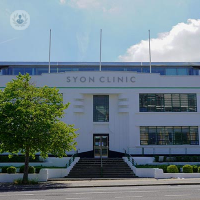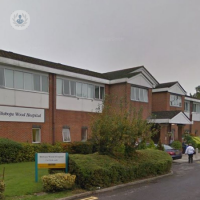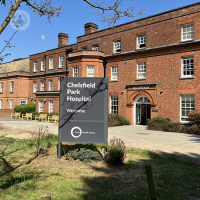What is a colectomy (bowel surgery)?
Colectomy is a surgical procedure that involves the removal of all, or the partial sectioning, of the large intestine (colon). The colon is a long tube-shaped organ at the end of the digestive tract. A colectomy may be required to treat or prevent diseases and conditions that affect the colon.
Bowel surgery will be carried out by a specialist surgeon.

Diseases and conditions treated with a total or partial colectomy
The following conditions may require a colectomy:
- Bowel obstruction – when the colon is blocked.
- Bowel perforation – a torn colon, or where bleeding cannot be controlled.
- Crohn’s disease – removing the affected part of the colon.
- Colon cancer – early-stage cancers may need a small section of the colon to be removed, whilst cancers at a later stage may require more to be removed.
- Lynch Syndrome - an inherited disorder that increases the risk of a number of types of cancer, particularly colon cancer.
- Precancerous colon polyps – those with a high-risk of developing cancer.
- Ulcerative colitis – a colectomy is required if medications are not working.
Different types of colectomy procedures
A total colectomy removes the entire large intestine. A partial colectomy, also known as a subtotal colectomy, removes only part of the colon. A hemicolectomy removes either the right or the left portion of the colon and a proctolectomy removes both the colon and the rectum.
Open vs. laparoscopic procedure for colectomy
During an open colectomy, a long incision is made in the wall of the abdomen enabling the doctors to see the colon. In a laparoscopic-assisted colectomy, a lighted tube with a video camera is inserted through one of several small incisions to guide the surgery.
Risks of colectomy (bowel surgery)
The procedure carries a risk of serious complications, which depend on the patients' general health and the type of colectomy performed. These complications can include:
- bleeding
- deep vein thrombosis (blood clots in the leg)
- infection
- injury to organs near your colon, such as the bladder and small intestines
- pulmonary embolism (blood clots in the lungs)
- tears in the sutures that reconnect the digestive system.
How to prepare for colectomy (bowel surgery)
In the days leading up to the colectomy, the doctor will suggest that the patient stops taking certain medications. Fasting before surgery is also required and drinking a solution such as a laxative that clears your bowels. In some cases, a doctor may prescribe antibiotics to prevent any infection from occurring.
11-13-2012 10-17-2023Bowel surgery
What is a colectomy (bowel surgery)?
Colectomy is a surgical procedure that involves the removal of all, or the partial sectioning, of the large intestine (colon). The colon is a long tube-shaped organ at the end of the digestive tract. A colectomy may be required to treat or prevent diseases and conditions that affect the colon.
Bowel surgery will be carried out by a specialist surgeon.

Diseases and conditions treated with a total or partial colectomy
The following conditions may require a colectomy:
- Bowel obstruction – when the colon is blocked.
- Bowel perforation – a torn colon, or where bleeding cannot be controlled.
- Crohn’s disease – removing the affected part of the colon.
- Colon cancer – early-stage cancers may need a small section of the colon to be removed, whilst cancers at a later stage may require more to be removed.
- Lynch Syndrome - an inherited disorder that increases the risk of a number of types of cancer, particularly colon cancer.
- Precancerous colon polyps – those with a high-risk of developing cancer.
- Ulcerative colitis – a colectomy is required if medications are not working.
Different types of colectomy procedures
A total colectomy removes the entire large intestine. A partial colectomy, also known as a subtotal colectomy, removes only part of the colon. A hemicolectomy removes either the right or the left portion of the colon and a proctolectomy removes both the colon and the rectum.
Open vs. laparoscopic procedure for colectomy
During an open colectomy, a long incision is made in the wall of the abdomen enabling the doctors to see the colon. In a laparoscopic-assisted colectomy, a lighted tube with a video camera is inserted through one of several small incisions to guide the surgery.
Risks of colectomy (bowel surgery)
The procedure carries a risk of serious complications, which depend on the patients' general health and the type of colectomy performed. These complications can include:
- bleeding
- deep vein thrombosis (blood clots in the leg)
- infection
- injury to organs near your colon, such as the bladder and small intestines
- pulmonary embolism (blood clots in the lungs)
- tears in the sutures that reconnect the digestive system.
How to prepare for colectomy (bowel surgery)
In the days leading up to the colectomy, the doctor will suggest that the patient stops taking certain medications. Fasting before surgery is also required and drinking a solution such as a laxative that clears your bowels. In some cases, a doctor may prescribe antibiotics to prevent any infection from occurring.


Faecal Immunochemical Test (FIT) to detect bowel disease
By Mr Arnold Christiaan Goede
2024-11-21
Determining whether someone is at risk for bowel cancer can be done via the FIT test, or Faecal Immunochemical Test. Leading colorectal and general surgeon, Mr Arnold Christiaan Goede speaks to Top Doctors about what patients need to know about the exam. See more


Bowel cancer: Causes, Symptoms and Treatments
By Mr Nicholas Reay-Jones
2024-11-21
Leading consultant surgeon and specialist coloproctologist Mr Nicholas Reay-Jones explains all you need to know about bowel cancer, including what the symptoms are, how a diagnosis is made, and what the risk factors are. See more


An introduction to: flexible sigmoidoscopy
By Mr Parv Sains
2024-11-18
In his latest online article, Mr Parv Sains gives us his expert insight into flexible sigmoidoscopy. He explains what it is, how to investigate the bowel, the risks and the benefits of the procedure. See more
Experts in Bowel surgery
-
Mr Abhay Chopada
SurgeryExpert in:
- Polyps
- Bowel surgery
- Piles (haemorrhoids)
- Anal fistula
- Hiatal hernia surgery
- Colon cancer
-
Professor Tan Arulampalam
SurgeryExpert in:
- Hernia
- Bowel surgery
- Gallbladder surgery
- Pilonidal sinus
- Anal fistula
- Endoscopy
-
Mr Parv Sains
SurgeryExpert in:
- Inguinal hernia
- Hernia
- Haemorrhoid surgery
- Bowel surgery
- Colonoscopy
- Gallbladder surgery
-
Mr Jason Smith
SurgeryExpert in:
- Bowel surgery
- Hernia
- Haemorrhoid surgery
- Gallstones
- Endoscopy
- Anal fistula
-
Mr Petr J Hanek
SurgeryExpert in:
- Inguinal hernia
- Gallstones
- Piles (haemorrhoids)
- Bowel surgery
- Laparoscopy
- Hernia
- See all

Syon Clinic - part of Circle Health Group
Syon Clinic - part of Circle Health Group
941 Great West Rd, Brentford TW8 9DU
No existe teléfono en el centro.
By using the telephone number provided by TOP DOCTORS, you automatically agree to let us use your phone number for statistical and commercial purposes. For further information, read our Privacy Policy
Top Doctors

Bishops Wood Hospital - part of Circle Health Group
Bishops Wood Hospital - part of Circle Health Group
Mount Vernon Hospital, Rickmansworth Rd, Northwood HA6 2JW
No existe teléfono en el centro.
By using the telephone number provided by TOP DOCTORS, you automatically agree to let us use your phone number for statistical and commercial purposes. For further information, read our Privacy Policy
Top Doctors

Chelsfield Park Hospital - part of Circle Health Group
Chelsfield Park Hospital - part of Circle Health Group
Bucks Cross Rd, Chelsfield, Orpington BR6 7RG
No existe teléfono en el centro.
By using the telephone number provided by TOP DOCTORS, you automatically agree to let us use your phone number for statistical and commercial purposes. For further information, read our Privacy Policy
Top Doctors
-
Syon Clinic - part of Circle Health Group
941 Great West Rd, Brentford TW8 9DU, West LondonExpert in:
- Allergies nose and ears
- Allergy Dermatitis
- Allergy
- Clinical analysis
- Anxiety
- Digestive
-
Bishops Wood Hospital - part of Circle Health Group
Mount Vernon Hospital, Rickmansworth Rd, Northwood HA6 2JW, West LondonExpert in:
- Vascular Surgery
- Cancer
- Cardiology
- General Surgery
- Neurological spinal surgery
- Orthopaedic surgery
-
Chelsfield Park Hospital - part of Circle Health Group
Bucks Cross Rd, Chelsfield, Orpington BR6 7RG, OrpingtonExpert in:
- Vascular Surgery
- Cardiology
- Colorectal surgery
- General Surgery
- Maxillofacial Surgery
- Orthopaedic surgery
- See all
- Most viewed diseases, medical tests, and treatments
- Weight loss injections
- Nipple discharge
- Abdominal pain
- Endovenous laser treatment (EVLA)
- Minimal access surgery (keyhole surgery)
- Head and neck cancer
- Neck lump
- Bariatric surgery
- Acellular dermal matrix (ADM)
- Prepectoral breast reconstruction
